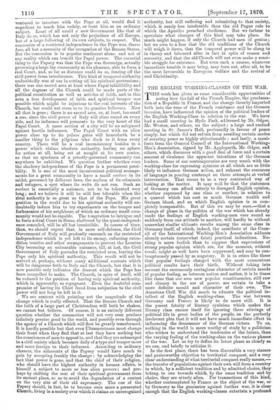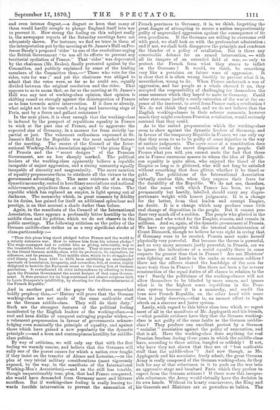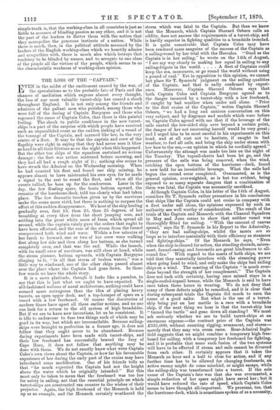THE ENGLISH WORKING-CLASSES ON THE WAR. T HIS week has given
us some considerable opportunities of- seeing how the fall of the French Empire, the proclama- tion of a Republic in France, and the change thereby imported both into the tone of the French resistance and the German invasion, have influenced the opinion of the political leaders of the English Working-Class in relation to the war. We have had a small meeting in Hyde Park, addressed by Mr. Odger, Mr. Weston, and others, on the subject ; a large and excited meeting in St. James's Hall, professedly in favour of peace simply, but which did not refrain from assailing certain modes- of securing peace as highly objectionable ; and lastly, a mani- festo from the General Council of the International Working- Men's Association, signed by Mr. Applegarth, Mr. Odger, and others, which discusses with a good deal of force and a certain amount of virulence the apparent intentions of the German leaders. Some of our contemporaries are very wroth with the working-class for expressing opinions at all which are so little likely to influence German action, and exhaust the resources of language in pouring contempt on these attempts at verbal intervention. That seems to us a very contracted way of looking at the matter. It may well be that the statesmen of Germany can afford utterly to disregard English opinion, whether expressed by one class or another, in relation to. a quarrel which has cost so much German wealth and German blood, and on which English opinion is so com- pletely irresponsible. But of this we may be sure,—that a. change of phase in the politics of the war which has already made the feelings of English working-men veer round so- suddenly from one attitude to another, will hardly be without somewhat similar ultimate results among the same class in Germany itself, of which, indeed, the manifesto of the Coun- cil of the International Working-Men's Association adduces- already certain (somewhat faint) practical indications. No- thing is more foolish than to suppose that expressions of strong popular opinion which are, for the moment, without result, might as well have been suppressed, and may be con- temptuously passed by as nugatory. It is in crises like these that popular feelings charged with the most momentous political results have their birth. Without taking into account the enormously contagious character of certain moods of popular feeling, as between nation and nation, it is in times like these that our own new popular constituencies, still raw and clumsy in the use of power, are certain to take a- more definite mould and character of their own. The- American Civil War did much to educate the political in- tellect of the English working-class. The war between Germany and France is likely to do more still. It is the purest fatuity of -literary cynicism which makes the literary class excuse itself for ignoring these stirrings of political life in great bodies of the people, on the perfectly- irrelevant plea that it will not have much immediate effect irk influencing the demeanour of the German victors. To us, nothing in the world is more worthy of study by a politician: who wishes to understand the tendencies of the future, than the varying feeling of the working-class on the various phases- of the war. Let us try to define its latest phase as clearly as we can, and briefly to criticize it.
In the first place, there has been discernible a very sincere- and praiseworthy objection to territorial - conquest, and a very clear understanding of what territorial conquest really means,— the transfer of populations against their own will from a country to which, by a sufficient tradition and by admitted choice, they belong, to one towards which, by the same tradition and by choice, they are utterly alien. For transactions of this kind, whether contemplated by France as the object of the war, or by Germany as the guarantee against further war, it is clear enough that the English working-classes entertain a profound
and even intense disgust,—a disgust so keen that many of them would hardly scruple to plunge England itself into war to prevent it. How strong the feeling on this subject really is, the newspaper reports of the Saturday meetings have not adequately shown. For instance, we find no trace in them of the interpretation put by the meeting at St. James's Hall on Pro- fessor Beesly's proposed 'rider' to one of the resolutions urging the British Government "to use all its efforts to prevent any territorial spoliation of France." That `rider' was deprecated by the chairman (Mr. Beales), finally protested against by the Committee, and publicly explained by some of the leading members of the Committee thus,—" Those who vote for the rider, vote for war ;" and yet the chairman was obliged to admit that the votes were, as far as he could see, equally divided between the original resolution and the rider. That appears to us to mean that, as far as the meeting at St. James's Hall was any test of working-class opinion, that opinion is shifting round so strongly against the disintegration of France as to lean towards active intervention. If it does so already, what might not be the result of a long and harrowing siege of Paris, met by a fierce and gallant resistance V In the next place, it is clear enough that the working-class is induced by the prospect of republican equality in France to wink at the past sins of France, and to aggravate the expected sins of Germany, in a manner far from strictly im- partial or just. The vehement enthusiasm expressed at St. James's Hall for the Republic was the most marked feature of the meeting. The sneers of the Council of the Inter- national Working-Men's Association against " the pious King " of Prussia and the " secret designs " of the Prussian Government, are no less sharply marked. The political leaders of the working-class apparently believe a republic incapable of unjust aggression, and a strong monarchy equally incapable of sincerity and magnanimity. The mere mention of equality prepossesses them to attribute all the virtues to the government advocating it. The mere existence of a strong dynastic monarchy, rooted in hereditary associations and national achievements, prejudices them as against all the vices. The republic which has replaced an empire, is light sprung out of darkness. The monarchy which, in great measure by fidelity to its duties, has gained for itself an additional splendour and prestige, is on that account a shade darker than before.
Again, in the manifesto of the Council of the International Association, there appears a profoundly bitter hostility to the middle class and its politics, which we do not observe in the public meetings. The following criticism on the policy of the German middle-class strikes us as a very significant stroke of class-partizanship :—
"Thus this pions king stood pledged before France and the world to a strictly defensive war. How to release him from his solemn pledge ? The stage-managers had to exhibit him as giving, reluctantly, way to the irresistible behest of the German nation. They at once gave the cue to the liberal German middle-class, with its professors, its capitalists, its aldermen, and its penmen. That middle class, which in its struggles for civil liberty had, from 1846 to 1870, been exhibiting an unexampled spectacle of irresolution, incapacity, and cowardice, felt, of course, highly delighted to bestride the European scene as the roaring lion of German patriotism. It revindicated its civic independence by affecting to force upon the Prussian Government the secret designs of that same Govern- ment. It does penance for its long-continued and almost religious faith in Louis Bonaparte's infallibility, by shouting for the dismemberment of the French Republic."
And in another part of the paper the writers somewhat boldly prophesy thus,—" History will prove that the German working-class are not made of the same malleable stuff as the German middle-class. They will do their duty." Such are the strongest features of the political feeling manifested by the English leaders of the working-class,—a real and keen dislike of conquest outraging popular wishes,— a vehement prepossession in favour of governments acknow- ledging even nominally the principle of equality, and against those which have gained a new popularity for the dynastic principle ;—and a keen and contemptuous hostility for middle- class politics.
By way of criticism, we will only say that with the first feeling we warmly concur, and believe that the Germans will sully one of the purest causes for which a nation ever fought if they insist on the transfer of Alsace and Lorraine,—on the plea of very trivial military considerations (most vigorously exposed, by the way, in the manifesto of the International Working-Men's Association),—and on the still less tenable, though unquestionably true, plea, that had France conquered, she would have demanded from Germany more and bitterer sacrifices. But if working-class feeling is really leaning to- wards forcible intervention to prevent the annexation of French provinces to Germany, it is, we think, forgetting the great danger of attempting to secure a nation unquestionably guilty of unprovoked aggression against the consequence of its own greediness. If the Germans are willing to overcome evil with good, we shall look on with the profoundest admiration ; and if not, we shall both disapprove the principle and condemn the blunder of a policy of retaliation. But is there any
conceivable defence for an armed intervention, with all its dangers of an extended field of war, — only to protect the French from what they strove to inflict on the Germans ? It would, we think, be something very like a premium on future wars of aggression. , It is clear that it is often wrong forcibly to prevent what it is, nevertheless, wrong to do. When France undertook a war of aggression, and her people as a whole cheered it on, they accepted the responsibility of challenging for themselves the same measure which they hoped to mete to Germany. Could sober statesmen justify a costly extension of the war at the ex- pense of the innocent, to avert from France such a retribution We do not think they could, and we do not believe that the English working-classes in their soberer moments, however much they might condemn Prussian retaliation, would seriously contend that they could.
As to the rooted prepossession which the working-class seem to show against the dynastic leaders of Germany, and in favour of the temporary Republic in France, we can only say that they seem to us to be guilty of some injustice in the way of surface judgments. The mere name of a constitution does not really reveal the secret disposition of the people. Call France what you will, you cannot undo the fact that there are in France enormous masses to whom the idea of Republi- can equality is quite alien, who enjoyed the tinsel of the Empire as long as it glittered, who will not long be satisfied without something that does glitter, whether it be tinsel or gold. The politicians of the International Association virtually confess this, when they express their fears for the durability of the Republic. We do not see, therefore, that the name with which France has been, we hope permanently but hastily, labelled, should carry any dispro- portionate weight with honest judgments. It is a change for the better, from that leaden and corrupt Empire, no doubt. It is a change which may produce some little real change of disposition in the people. But it cannot pro- duce very much all of a sudden. The people who gloried in the Empire, and who voted for the Empire, remain, and remain in millions. And so, again, of the dynastic government of Prussia. We have no sympathy with the internal administration of Count Bismarck, though we believe he was right in seeing that if Germany were to be created, Prussia must make herself physically very powerful. But because the throne is powerful, and on very many accounts justly powerful, in Prussia, are we to ignore the indications of a social equality there in some respects far greater than that in France ? Are not Ministers' sons fighting on all hands in the ranks as common soldiers ? Have not the officers shared the hardships of the men far more truly than in France ? Has there not been a far severer construction of the equal duties of all classes in relation to the war ? Surely the politicians of the working-classes will not allow themselves to be blinded by mere names, and ignore
what is in the highest sense republican in the Prus- sian system because it is a monarchy, and credit the bran new French Republic, on the other hand with more than it justly deserves,—that is, an earnest effort to begin afresh on a sincerer and juster system.
Lastly, with regard to this bitter class tone which we regret most of all in the manifesto of Mr. Applegarth and his friends, —what possible evidence have they that the German working- class is not guilty of the same faults as the German middle- class ? They produce one excellent protest by a German " socialist " association against the policy of annexation, and that is all. Have the working-class done anything for real Prussian freedom during these years in which the middle-class have, according to these critics, bungled so selfishly V If not, why have they not shown that they are of " less malleable stuff than the middle-class "? And now though, as Mr.
Applegarth and his associates freely admit, the great German Army is really composed of the German working-class, do they look for any of that reluctance in it to push on the war into
an aggressive stage and bombard Paris which they profess to expect from the German artizans ? If there were this insuper- able reluctance, the Army would virtually have the decision in its own hands. Without its hearty concurrence, the King and his Generals.and Ministers are as powerless as babies. The
simple truth is, that the working-class in all countries is just as liable to accesses of blinding passion as any other, and it is not the part of the leaders to flatter them with the notion that they monopolize the generous instincts of a nation. While there is much, then, in the political attitude assumed by the leaders of the English working-class which we heartily admire and sympathize with, there is much also which betrays that tendency to be blinded by names, and to arrogate to one class of the people all the virtues of the people, which seems to us the characteristic weakness of working-class opinion.
































 Previous page
Previous page